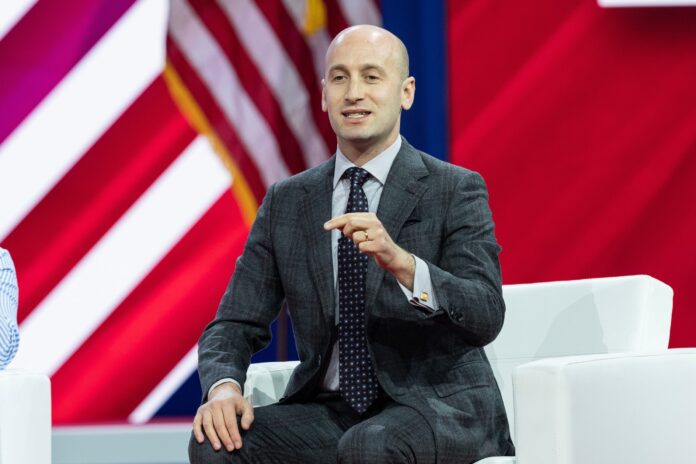
Courtroom Briefs
- America First Legal (AFL), led by Trump confidant Stephen Miller, has unleashed a seismic lawsuit against Supreme Court Chief Justice John G. Roberts, Jr., accusing him of wielding unconstitutional powers through the Judicial Conference and Administrative Office of the U.S. Courts.
- The suit claims these judicial bodies operate as rogue “executive agencies,” collaborating with progressive lawmakers to undermine conservative Supreme Court justices like Clarence Thomas and Samuel Alito.
- Filed in a Washington, D.C. federal court, the case challenges the judiciary’s exemption from Freedom of Information Act (FOIA) requests, igniting a constitutional clash over the separation of powers.
By Samuel Lopez – USA Herald
[WASHINGTON, D.C.] – In a legal bombshell that could reshape the balance of power in America’s judiciary, the America First Legal Foundation (AFL), a conservative group founded by Trump advisor Stephen Miller, has filed a daring lawsuit against Supreme Court Chief Justice John G. Roberts, Jr., and Robert J. Conrad, Director of the Administrative Office of the U.S. Courts.
Filed on April 22, 2025, in the U.S. District Court for the District of Columbia, the complaint accuses the duo of running an “unconstitutional shadow agency” that oversteps judicial boundaries and violates federal transparency laws. Presided over by U.S. District Judge Trevor N. McFadden—a Trump appointee—the case promises to ignite a fierce debate over judicial independence, executive authority, and the politicization of America’s courts.
At the heart of AFL’s lawsuit is a provocative claim: the Judicial Conference of the United States, chaired by Chief Justice Roberts, and its administrative arm, the Administrative Office of the U.S. Courts, are not neutral judicial entities but “executive agencies” wielding powers that belong to the President.
By allegedly collaborating with progressive lawmakers like Senator Sheldon Whitehouse and Representative Hank Johnson, these bodies are accused of fueling a “lawfare” campaign against conservative Supreme Court justices, particularly Clarence Thomas and Samuel Alito.
AFL argues that this overreach not only undermines the separation of powers but also demands compliance with the Freedom of Information Act (FOIA), a law traditionally inapplicable to the judiciary.
The lawsuit’s origins trace back to AFL’s FOIA requests seeking communications between the Judicial Conference, the Administrative Office, and lawmakers Whitehouse and Johnson. These progressive Democrats have spearheaded investigations into alleged ethical lapses by Justices Thomas and Alito, accusing them of conflicts of interest tied to their personal and financial dealings. Backed by what AFL calls an “ideologically favorable legacy media,” these efforts have fueled public scrutiny and even physical threats against conservative justices, including Thomas, Alito, and Brett Kavanaugh.
When the Judicial Conference and Administrative Office rejected AFL’s FOIA requests, claiming exemption from the law, AFL responded with a lawsuit that could redefine the judiciary’s role in America’s constitutional framework.
AFL’s complaint asserts that the Judicial Conference and Administrative Office perform “executive functions” by engaging in regulatory actions, responding to congressional oversight, and issuing binding policies—tasks that, under the U.S. Constitution, fall under the executive branch’s purview. “Under our constitutional tradition, accommodations with Congress are the province of the executive branch,” AFL argues. “The Judicial Conference and the Administrative Office are therefore executive agencies.” If successful, the lawsuit could place these judicial bodies under presidential oversight.
AFL’s lawsuit hinges on a novel legal argument: because the Judicial Conference and Administrative Office exercise “executive powers,” they must comply with FOIA, a law that mandates transparency for executive branch agencies. Historically, the judiciary has been exempt from FOIA, a position upheld by federal courts in cases dating back to 2003 and 2008. The Administrative Office, created by Congress in 1939 to handle budgeting and logistics for the federal courts, has long operated under the judiciary’s umbrella, free from the transparency requirements imposed on executive agencies.
AFL challenges this status quo, arguing that the Judicial Conference’s policymaking role and the Administrative Office’s regulatory functions blur the line between judicial and executive authority. The lawsuit seeks a court order declaring both entities subject to FOIA, compelling them to release communications with Senator Whitehouse and Johnson, and setting a deadline for compliance. “Judicial relief here not only preserves the separation of powers but also keeps the courts out of politics,” AFL’s complaint asserts.
The lawsuit arrives at a time of heightened tension between the Trump administration and the federal judiciary. Since taking office, President Donald Trump has faced judicial roadblocks to several executive orders, from immigration policies to agency restructuring. Federal judges have issued injunctions halting initiatives like mass deportations and voting restrictions, prompting Trump to publicly criticize the judiciary and even call for the impeachment of certain judges. In March 2025, Chief Justice Roberts pushed back, stating, “For more than two centuries, it has been established that impeachment is not an appropriate response to disagreement concerning a judicial decision.”
What’s Next?
As the case moves forward under Judge McFadden, all eyes will be on how the court navigates this constitutional minefield. A ruling in AFL’s favor could upend decades of precedent, subjecting the judiciary to executive oversight.
Conversely, a dismissal could reinforce the judiciary’s autonomy but leave unresolved questions about transparency and accountability.
Explore More
🔗 Follow us on X @RealUSAHerald
For a deeper dive into the constitutional implications of this case, join me on Patreon at Legal Insights and Strategiesfor exclusive analyses, templates, and insider tips.


